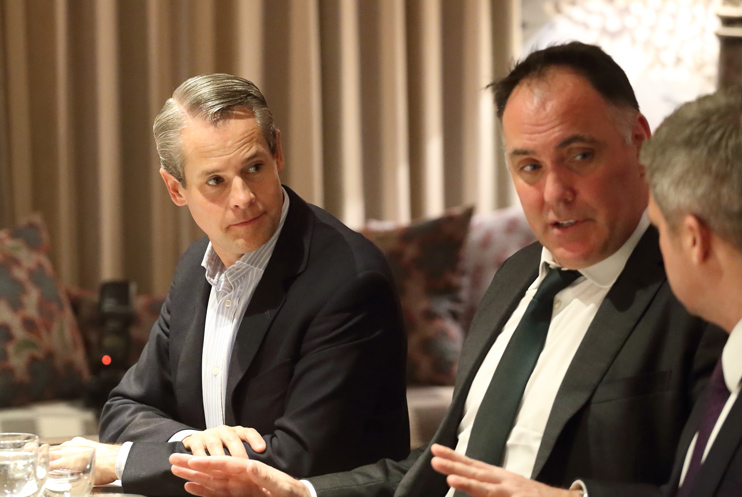Savannah Group recently hosted its inaugural Media, Sports and Entertainment dinner for a selection of prominent senior executives, hosted by George Williams. The focus of the dinner was a discussion around how an ever more digital future will impact businesses of all shapes and sizes within the Media, Sport and Entertainment industry.
We welcomed former FT columnist, author and futurist Ade McCormack as our guest speaker who gave a short summary of what he sees as societies move into the fourth business model: the digital age. What follows are key insights from both Ade’s presentation and the following discussion.
Biz 4.0: The Digital Age
The digital age is a return to our anthropological routes as hunter-gatherers. Over the past 150 years, humans have moved out of the fields as farmers and into the cities as factory workers. These heavily routine based jobs left humans craving the mobility, sociality and creativity that they experienced as hunter-gatherers in the Savannah.
What we are already starting to see over the past decade and what we’ll see more of in the future are businesses that look to harness the cognitive functions of humans by building and designing workplaces and organisations that give us the freedom to do what we are best at. At the same time, humans will continue to augment themselves with technology through wearable or injectable technology.
Leaders of the future will therefore be apt at using the significant amount of data and analytics available to them to inform decisions, and will look to the people within the business to drive the business strategy rather than dictating a strategy that rapidly becomes outdated from the top of the organisation.
This of course has significant implications for talent. Organisations will become ever more diversified as they look for individuals who can bring a range of experiences and backgrounds to the business to help creatively challenge existing ways of doing things. Businesses as a result will become polymodal and experiment with many different business models. The nature of the digital age means more businesses are at risk from left-field innovation, and a polymodal business is one that not just has a plan A but also a plan B, C, D and E.
Where Will This New Breed Of Talent Come From?
So what are the implications of this digital future on the Media, Sport and Entertainment industry? One of the concerns is the current educational system which is both rigid and based on a test-passing points system that is at odds with how you would test the kind of creative thinking that future roles will require. Is our current educational system restricting the amount of creative talent that is emerging from schools and universities?
There may be hope though based on a recent experience at a shared working space in Manhattan. The space itself was packed with creative, liberated talent, and the positive impact shared working spaces seem to be having is largely based on their model of small numbers of people working collaboratively.
Some organisations are taking steps to address this, and hiring from previously overlooked backgrounds is now a fundamental way of introducing fresh thinking. An example of which is a large management consultancy that is hiring people from council estates who have the hunger and the desire to succeed and aren’t “tinged” by the traditional academic thinking around the table.
For the individual, gone are the days when a degree and a foot in the door of a big reputable business meant you are on the conveyor belt to a successful career. Due to the rapidly changing market, career management has now changed from something you did once in sixth form to something you need to do on a regular basis. At all times individuals need to ask themselves “Am I still economically relevant?”
The Rise Of The Sub Brands
In response to the need to bring in new talent and experiment with new business models, a number of businesses have set up sub brands that in some cases are cannibalising their existing businesses. The need to attract a different type of talent was one of the main reasons why these businesses were set up as sub brands, and these businesses have a very different look and feel to their parent organisation. People work in smaller groups in a more flexible working environment and in cases they can be extremely successful. As an example, a digital sub brand was set up that after initially cannibalising their traditional business, within six months was delivering a five times multiplier on that lost revenue.
Changing Consumption Habits
Pressure in the Media, Sport and Entertainment industries is also coming from the changing habits and expectations of individuals when consuming news and entertainment. New viewers to football for instance are unlikely to sit through the whole game. Instead, they want to watch their football in snackable bites, and rarely will sit through the half time analysis. Linear TV isn’t set up for this. Some organisations are also experiencing challenges keeping themselves as first choice to their loyal but ageing audience while also appearing fresh and dynamic to a new type of audience which consumes entertainment in completely different ways.
The Echo Chamber Effect
In a world of social media, where more news outlets than ever before can reach a varied audience instantly, you would expect that individuals now access a broader range of opinions to makes them better informed about a particular topic. Unfortunately in practice it isn’t working like that, and this is perhaps the irony of social media. The pattern that media executives are seeing increasingly is individuals choosing to follow or digest news that reinforces their pre-formed opinion about a topic and filtering out differing views. Sometimes referred to as an echo chamber, individuals are increasingly limiting their exposure to alternative ways of viewing a topic. Is this the outcome that is best for the industry or serves the people in the best way?
Optimising For A Data Driven World
Voice interaction platforms like Amazon’s Alexa also have the potential to majorly disrupt news providers and other established businesses. For instance, when someone asks Alexa for the news headlines, from which source will Alexa read? All types of businesses optimised for a text based Internet will have to think about how to also optimise themselves in a voice activated world.
The evening was very positively received by all that attended, and the presentation and conversation was both stimulating and engaging. There are clearly many challenges and opportunities within the Media, Sport and Entertainment industry, and leaders will need to continually reflect to ensure they stay relevant in a highly competitive environment. To find out more about Savannah’s media practice including our areas of expertise and examples of how we help clients.









